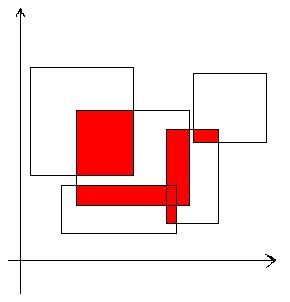覆盖的面积(HDU 1255 线段树)
覆盖的面积
Time Limit: 10000/5000 MS (Java/Others) Memory Limit: 65536/32768 K (Java/Others)
Problem Description
Input
输入数据的第一行是一个正整数T(1<=T<=100),代表测试数据的数量.每个测试数据的第一行是一个正整数N(1<=N<=1000),代表矩形的数量,然后是N行数据,每一行包含四个浮点数,代表平面上的一个矩形的左上角坐标和右下角坐标,矩形的上下边和X轴平行,左右边和Y轴平行.坐标的范围从0到100000.
注意:本题的输入数据较多,推荐使用scanf读入数据.
注意:本题的输入数据较多,推荐使用scanf读入数据.
Output
对于每组测试数据,请计算出被这些矩形覆盖过至少两次的区域的面积.结果保留两位小数.
Sample Input
2 5 1 1 4 2 1 3 3 7 2 1.5 5 4.5 3.5 1.25 7.5 4 6 3 10 7 3 0 0 1 1 1 0 2 1 2 0 3 1
Sample Output
7.63 0.00 线段树计算被覆盖部分的面积#include <iostream> #include <cstdio> #include <cstring> #include <cmath> #include <cstdlib> #include <string> #include <algorithm> #include <queue> #include <vector> #include <map> #define LL long long using namespace std; const int Max = 1000; typedef struct Tree { int num; double OneL,TwoL;//记录区间被覆盖多于一次和两次的长度 }Tree; Tree Tr[Max*10]; typedef struct Point { double x; double y1; double y2; int op; bool operator < (const struct Point a)const { return x<a.x; } }Point; Point P[Max*3]; vector <double>y; int T,n; void Pushup(int L,int R,int st) { if(Tr[st].num>=2) { Tr[st].TwoL=Tr[st].OneL=y[R-1]-y[L-1]; return ; } if(Tr[st].num==1) { if(L+1==R) { Tr[st].TwoL=0; Tr[st].OneL=y[R-1]-y[L-1]; } else { Tr[st].OneL=y[R-1]-y[L-1]; Tr[st].TwoL=Tr[st<<1].OneL+Tr[st<<1|1].OneL; } return ; } if(Tr[st].num==0) { if(L+1==R) { Tr[st].OneL=Tr[st].TwoL=0; } else { Tr[st].OneL=Tr[st<<1].OneL+Tr[st<<1|1].OneL; Tr[st].TwoL=Tr[st<<1].TwoL+Tr[st<<1|1].TwoL; } return ; } } void Build(int L,int R,int st) { Tr[st].num=0; Tr[st].OneL=Tr[st].TwoL=0; if(L+1==R) { return ; } int mid = (L+R)>>1; Build(L,mid,st<<1); Build(mid,R,st<<1|1); Pushup(L,R,st); } void Update(int L,int R,int st,int l,int r,int d) { if(l>=R||r<=L) { return ; } if(L>=l&&R<=r) { Tr[st].num+=d; Pushup(L,R,st); return ; } int mid = (L+R)>>1; if(l<=mid) { Update(L,mid,st<<1,l,r,d); } if(r>mid) { Update(mid,R,st<<1|1,l,r,d); } Pushup(L,R,st); } int main() { double x1,x2,y1,y2; scanf("%d",&T); while(T--) { scanf("%d",&n); y.clear(); map<double ,int >M; int m=0; for(int i=0;i<n;i++) { scanf("%lf %lf %lf %lf",&x1,&y1,&x2,&y2); P[m].x=x1; P[m].y1=y1; P[m].op=1; P[m++].y2=y2; P[m].x=x2; P[m].y1=y1; P[m].op=-1; P[m++].y2=y2; y.push_back(y1); y.push_back(y2); } sort(P,P+m); sort(y.begin(),y.end()); y.erase(unique(y.begin(),y.end()),y.end());//去重 int sum = y.size(); for(int i=0;i<sum;i++)//重新编号 { M[y[i]]=i+1; } double Area =0 ; double h; Build(1,sum,1); for(int i=0;i<m-1;i++) { Update(1,sum,1,M[P[i].y1],M[P[i].y2],P[i].op); h=P[i+1].x-P[i].x; Area += (h*Tr[1].TwoL);//计算面积 } printf("%.2f\n",Area); } return 0; }
